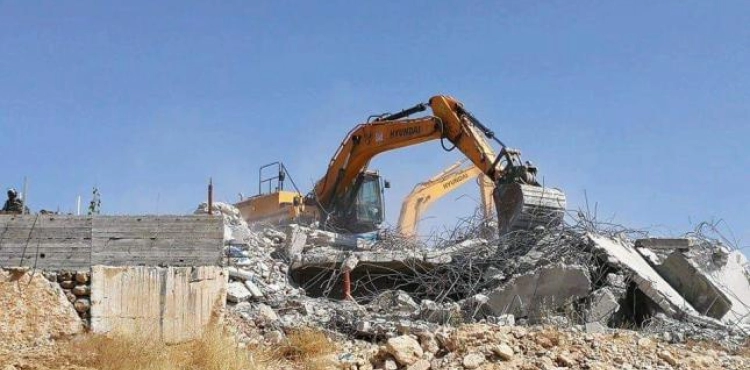Palestinian families from Hebron find themselves in front of very difficult options after their homes were demolished and displaced in favor of Israeli settlement expansion.
Munther Abu Aram, who is in his forties, has lived in a cave above the rocky hillside of Hebron, accompanied by his wife and four children, in difficult humanitarian conditions for several months.
Abu Aram, 48, told Xinhua that he was forced to live with his family in a cave, after the Israeli army demolished his home twice, claiming that he had not obtained a building permit.
He explains that the occupation authorities demolished his house for the first time in 2018, forcing him to rebuild it again, to be demolished again at the end of 2019.
Abu Aram lived in a cement and tin house in Khirbet Janab, south of the Hebron Mountains, which are classified under Area C, which represents more than 60 percent of the West Bank.
Palestinians complain that the occupation has allocated most of Area C to settlement expansion at the expense of the rights of Palestinian citizens, who complain of daily Israeli violations and attacks.
The occupation authorities prevent Palestinians from building in Area C without obtaining a permit from them, and they periodically demolish Palestinian homes, claiming construction without a permit.
The Israeli Information Center for Human Rights in the Occupied Palestinian Territories (B´Tselem) monitored the demolition of 1,404 Palestinian homes in Area C during 2019, which led to the displacement of 6,207 Palestinians, including 3,134 children.
Abu Aram, while feeding one of his young children, says he and his family suffer the two things by living inside a cave without any infrastructure, and the risk of getting stung by snakes, snakes and harmful insects.
Abu Aram usually walks a long distance, using his donkey as a means to reach the nearest water station to buy for his family´s daily use.
He adds: "Our life is very difficult, and Israel is working to expel us from our land in order to implement the scheme of annexation and settlement expansion, and impose its control on all Palestinian lands."
The same situation complains about the 40-year-old Khalil Jabreen, who lives with his family of six in a cave of 250 square meters for more than two years near his demolished home in the remote Khirbet (Al-Fakhit) in Hebron.
Jabreen told Xinhua that his house was destroyed three times by the bulldozers of the occupation from 2000 to 2018 without being allowed to obtain a building permit, to avoid repeated demolitions.
He adds that settlers attack his family constantly, while the occupation forces continue to establish pop-up military checkpoints at the entrances to Khirbet Al-Fakhit to prevent them from bringing food, water and other needs.
Moreover, Jibrin points out in anger that the area where he lives and his family lacks schools, health centers and clinics.
Hebron is the largest governorate in the West Bank in terms of area and population. According to the Palestinian Central Bureau of Statistics, its population is about 750,000, compared to about 21,000 Israeli settlers.
A member of the General Committee for the Defense of Lands in the West Bank, Abd al-Hadi Hanash, accuses Israel of working systematically to Judaize Hebron, and of annexing the old town to the settlement (Kiryat Arba) established in the governorate.
Hantash told Xinhua that Israel considers Hebron, which includes 27 Israeli settlements and 32 outposts, "a city of religious conflict, and the majority of settlers in the governorate are characterized by religious fanaticism and political extremism."
He added, "We are facing daily crimes against the Palestinian population in Hebron, which requires filing lawsuits against Israel before the International Criminal Court, and urging it to issue decisions that do justice to the Palestinians."












